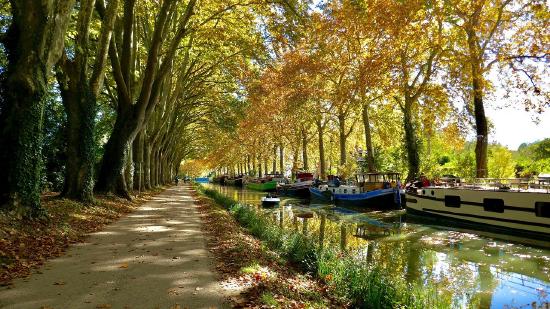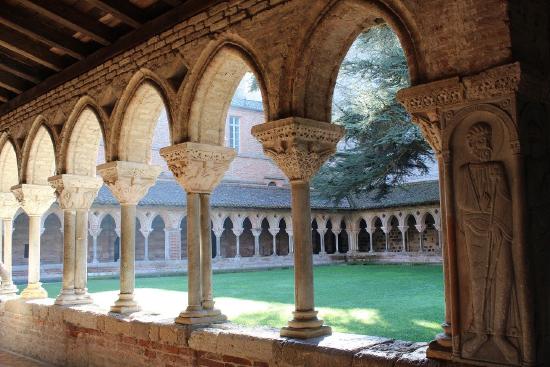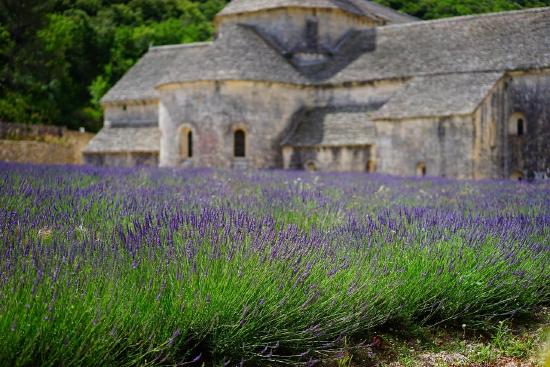8.5: Francophonie - Points culturels
- Page ID
- 120674
In this section, you will learn about:
- Three regions in France: L'Occitanie, La Provence & Le Pays Basque
- The French Academy
- French in the Middle Ages
On découvre !
 "Canal du Midi" by Anwic is in the Public Domain
"Canal du Midi" by Anwic is in the Public Domain
 "Cloitre" by Lisa Dubois is in the Public Domain
"Cloitre" by Lisa Dubois is in the Public Domain
 "This work" by Hans Braxmeier, pixabay is in the Public Domain
"This work" by Hans Braxmeier, pixabay is in the Public DomainFrancophonie
Toulouse et L'Occitanie
La Provence
Le Pays Basque
Regardez cette vidéo sur Toulouse et mettez les endroits dans le bon ordre.
Quelles sont les 10 raisons qui font que Toulouse est « la meilleure ville de France » ?
- ________
- ________
- ________
- ________
- ________
- ________
- ________
- ________
- ________
- ________
Visite du Langedoc-Roussillon avec TV5Monde
Complétez les activités 1, 2, et 3 sur cette feuille.
La langue vivante
The French Academy
L’Académie Française (The French Academy) is an institution whose purpose is to standardize the French language. This means that its 40 members are in charge of making sure the rules and proper use (le bon usage) of the language are taught and respected.
L’Académie is indeed comprised of 40 members, male or female, informally called the immortals (les immortels) because they are elected for life. They can be elected from any walk of life, regardless of their education.
L’Académie publishes an official dictionary of the French language, and it announces new words that make their way into the dictionary. One of the new words was smiley which entered the dictionary in 2019. The latest edition of the dictionary, the 9th edition, was published in 2012.
The French Academy was created in 1634 by a famous cardinal and minister to King Louis XIII, le cardinal Richelieu. In 1635, it became official by Kind Louis XIII.
Some famous immortels throughout history are Voltaire, Victor Hugo, Alexandre Dumas, Louis Pasteur.
Here are some additional readings to learn more about the French Academy:
Le français du Moyen Âge
What languages were spoken in France before the Académie Française came about? And did France have one dominant language before the 17th century?
During the 5th century B.C., there were three main languages were spoken in France, le grec (Greek), le ligure (Ligurian), and le latin (latin). Then, when the Franks invaded France, their language became intertwined with these three existing languages and that is what brought about the roman or gallo-roman, which was a form of vernacular Latin language.
The oldest document of written roman or Old French that has survived is called "The Oaths of Strasbourg" (les Serments de Strasbourg), written in 842 AD. It was a pledge of allegiance between Louis the German (Louis le Germanique), ruler of East Francia and his half-brother Charles the Bald (Charles le Chauve), ruler of West Francia against their brother Lothair I (Lothaire 1er). The two brothers spoke different languages, so the Oaths were written in Medieval Latin (le latin médiéval), Old French (le roman), and High German (le tudesque). It is said that this document gave birth to the French language.
In the Middle Ages, the educated spoken classical Latin while the rest of the population a vernacular Latin. During the 10th century, the king Hugues Capet was the first to officially use the French language, called le francien at the time, and to begin nationalizing the French language. But during the Middle Ages, and until the 16th century, there were many very different dialects of the French language spoken all over France. In the northern region, the language was called la langue d’oïl, oïl meaning yes, and in the southern region the language was called la langue d’oc, oc also meaning yes. But there were many other regional languages that still exist today. It is said that the Troubadours (called Trouvères in the north) spread the Old French language throughout the region.
Here is a map that shows the different languages and dialects spoken throughout France. In 1539 the King François 1er (Francis I) decided to nationalize the francien or François language, also called le moyen français (Middle French), spoken in the Île de France region (near Paris).
Medieval French was drastically different from the French spoken in France today. It was rather similar to Latin, Spanish, and Italian.
Here is an example of a text written in Medieval French by author Marie de France. On the left side is the modern French translation and on the right side you can see how incomprehensible Old French can be to current French speakers.
On explore !
Activité
Écoutez la chanson La vie en rose est remplir les espaces vides avec les mots qui manquent
La vie en rose
Des yeux qui font baisser les miens Un _______ qui se perd sur sa bouche Voilà le portrait sans retouches De _______ auquel j'appartiens
Quand il me prend dans ses bras Il me ______ tout bas Je vois la vie en rose
Il me dit des mots d’_______ Des mots de tous les jours Et ça me fait quelque chose
Il est entré dans mon ________ Une part de bonheur Dont je connais la cause
C'est lui pour moi, moi pour lui dans la ____ Il me l'a dit, l'a juré pour la vie
Et dès que je l'aperçois Alors je ______ en moi Mon cœur qui bat
Des nuits d'amour à plus finir Un grand _______ qui prend sa place Des ennuis, des chagrins s'effacent Heureux, heureux à en ______
Quand il me prend dans ses ______ Il me parle tout bas Je vois la vie en rose
Il me dit des mots d'amour Des _____ de tous les jours Et ça me fait quelque chose
Il est entré dans mon cœur Une part de bonheur Dont je connais la cause
C’est _____ pour moi, moi pour toi dans la vie Il me l'a dit, l'a juré pour la vie
Et dès que je t'aperçois Alors je sens dans moi Mon cœur qui bat La la, la la, la la La la, la la, ah la La la la la
On approfondit !
Use the following resources to type accents and/or search for words:
- Accents: ç, à, é, è, â, ê, î, ô, û, ù, ë, ï, ü
- Dictionnaire français-anglais


